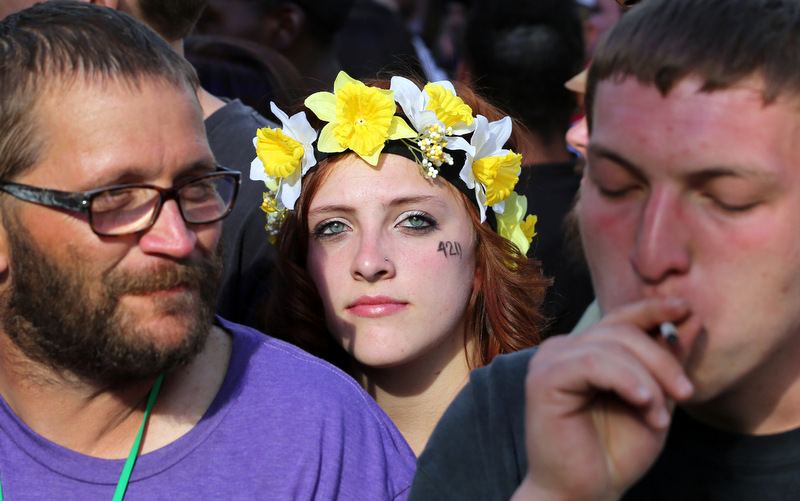 Partygoers listen to live music and smoke pot on the second of two days at the annual 4/20 marijuana festival in Denver, Sunday April 20, 2014. (AP/Brennan Linsley)
Partygoers listen to live music and smoke pot on the second of two days at the annual 4/20 marijuana festival in Denver, Sunday April 20, 2014. (AP/Brennan Linsley)
(TheAntiMedia) For decades, drug warriors have argued that if marijuana is legalized, it will lead to a sharp spike in adolescent use and addiction. As Republican Congressman Andy Harris of Maryland said recently,
“Relaxing [marijuana] laws clearly leads to more teenage drug use. It should be intuitively obvious to everyone that if you legalize marijuana for adults, more children will use marijuana because the message that it’s dangerous will be blunted.”
A 2014 Monitoring the Future study released this week, however, proves this tired talking point false. Conducted by the University of Michigan and the National Institutes on Drug Abuse, the study showed that teen alcohol and drug use was down across the board in 2014. Since the 90s, alcohol, marijuana, and cigarette use all decreased. Though teen marijuana use was up in the latter half of the 2000s, it has again begun to fall.
The survey of 40,000 8th, 10th, and 12th graders found that daily use of all drugs was also down, showing that addiction to marijuana is not as inevitable as prohibitionists would like the American public to believe. The study’s authors credit prevention efforts with the decline.
The findings comport with previous research that found legalization does not lead to increased use among teens.
Co-author of one such study, David Rees, found no increase in use following the legalization for medical purposes. When questioned about it, he said
“no single state stood out — the effect of massing a medical marijuana law on youth consumption appears to be zero across the board.”
The Washington Post notes that the highest spike in teenage marijuana use was in the early 1990s, when the Drug War was in full swing. It began to fall in the late 1990s, around the same time that states began legalizing medical marijuana. This represents correlation, not definite causation, but the links are evident.
This week’s study can be added to a growing body of evidence that shows not only does prohibition not work–it is counter-productive. This is obvious when the waste of money and resources and the increase in crime and black market activities caused by the Drug War are taken into account.
Fortunately, studies like 2014 Monitoring the Future are working to de-stigmatize the marijuana plant, which in recent years has been proven to offer far more benefits than risks.
Medical and recreational marijuana is increasingly legal across the country and this week, Congress effectively ended the war on medicinal use.
Though teen alcohol, marijuana, cigarette, and overall drug use is down, it is worth noting that the demographic’s addiction to painkillers has been rising (along with the rest of the American population). While they are legal as approved by the FDA, painkillers are often obtained illegally from adolescents raiding their parents’ medicine cabinets.
The findings of the new study, however, should be good news to all Americans who claim to care about the well-being of teenagers. Considering the lack of negative consequences that come along with legalizing marijuana (in addition to findings that it is not as harmful as previously propagandized), even prohibitionists should be celebrating–after all, they claim to advocate (at last in part) for the children.

